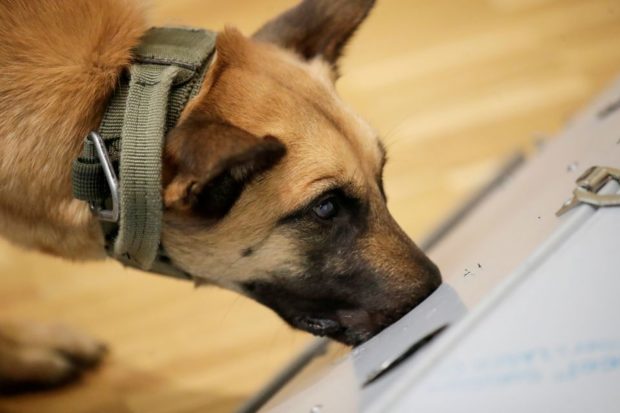Trained on smelly socks, bio-detection dogs sniff out COVID-19

Researchers at Hanover University’s vet clinic present Filou, the 3-year-old Belgian shepherd which is able to detect COVID-19 in human saliva samples, in Hanover, Germany, February 3, 2021. REUTERS/Hannibal Hanschke/File Photo
LONDON — Sniffer dogs trained using smelly socks worn by people infected with the SARS-CoV-2 virus could soon be used at airports or mass gathering venues to pick up the “corona odor” of COVID-19-infected people, British scientists said on Monday.
Working in teams of two, the COVID-trained dogs could screen a line of several hundred people coming off a plane within half an hour, for example, and detect with up to 94.3% sensitivity those infected, the scientists said.
Presenting results of an early stage study – which involved some 3,500 odor samples donated in the form of unwashed socks or T-shirts worn by members of the public and health workers – the researchers said the dogs were even able to sniff out asymptomatic or mild COVID-19 cases, as well as cases caused by a mutant variant that emerged in the UK late last year.
“Dogs could be a great way to screen a large number of people quickly and prevent COVID-19 from being re-introduced into the UK,” said Steve Lindsay, a professor at Durham University’s department of biosciences who worked on the study.
James Logan, a disease control specialist at the London School of Hygiene & Tropical Medicine who led the project, said the major advantage of sniffer dogs over other screening methods such as lateral flow testing is their “incredible speed and good accuracy among large groups of people”.
Article continues after this advertisementThe British research, published online on Monday before being peer-reviewed, adds to other pilot projects in Finland, Germany, Chile and elsewhere which are trialling COVID-trained sniffer dogs at airports.
Article continues after this advertisementThe dogs in the UK study were trained over several weeks by being introduced to 200 odor samples from people who had tested positive for COVID-19, as well as 200 control samples from people who tested negative.
The highest performing dogs in the trial detected coronavirus odor in the samples with up to 94.3% sensitivity, meaning a low risk of false negative results, and up to 92% specificity, meaning a low risk of false positive results.
This accuracy is higher than recommended by the World Health Organization for COVID-19 diagnostics, Logan’s team said, with the dogs outperforming lateral flow tests, which have an overall sensitivity of between 58% and 77%.
Independent experts cautioned that the findings would need to be replicated in real-world situations.
“This proof of concept study suggests that trained detection dogs could be used in places like airports, sports stadiums and concert venues,” said Lawrence Young, a virologist and professor of molecular oncology at Warwick University.
“The big question is will this approach work in the real world on people rather than samples of socks and shirts?”
For more news about the novel coronavirus click here.
What you need to know about Coronavirus.
For more information on COVID-19, call the DOH Hotline: (02) 86517800 local 1149/1150.
The Inquirer Foundation supports our healthcare frontliners and is still accepting cash donations to be deposited at Banco de Oro (BDO) current account #007960018860 or donate through PayMaya using this link.